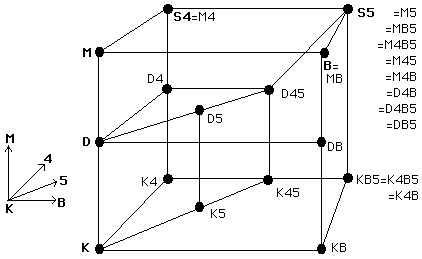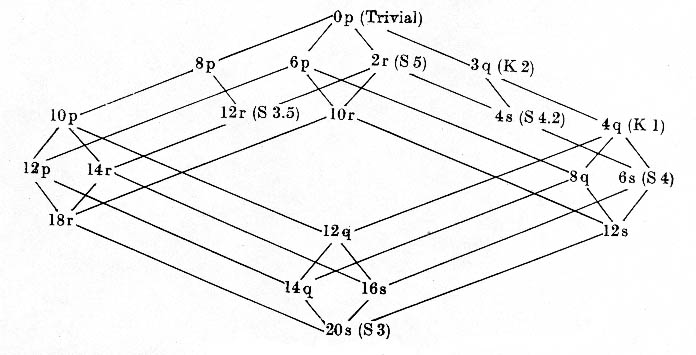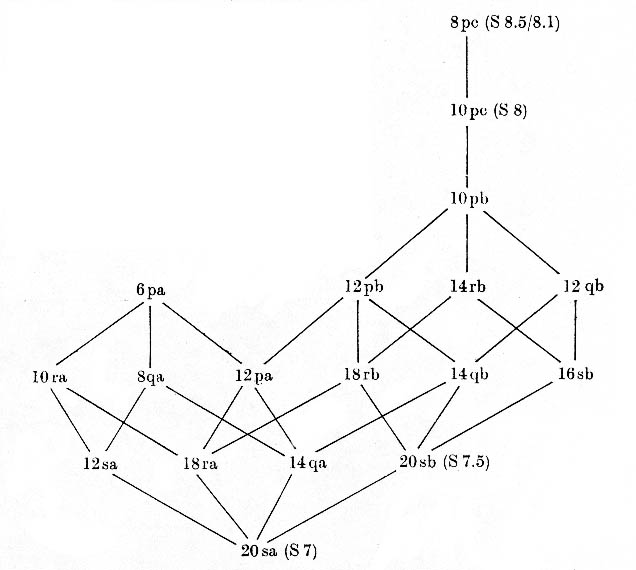 He has also written a very good quick Introduction to Modal
Logics (Where I found the diagram) for the Stanford Encyclopedia of Philosophy.
He has also written a very good quick Introduction to Modal
Logics (Where I found the diagram) for the Stanford Encyclopedia of Philosophy.Record of Recent Changes to these pages.
Table of contents
There are lots of logic systems (especially modal logic systems) that are related to each other by the addition of an axiom or two.
I have only been able to find a few summaries of such interrelationships, and none of those online.
What few cross references that I have seen give "facts" but no clue as to where they came from. If a reference is given, it only points to a book, and you have no idea where in the book the fact is given. I suspect that the main contribution that these pages can make is to provide a cross reference table that one can actually use to go look up the interesting facts that one may find here.
There are important facts about systems that I have not yet had time to enter, and there are important facts about systems that I don't happen to know.
If there is an important fact of a system that you think I should have listed, and I didn't, please send me that fact and a reference where I can look up the information.
If you have comments (positive or negative) about these pages, I would like to hear about them. If you spot errors, I would like to hear about it. I can be contacted at: John.Halleck@utah.edu If there are facts you think that need to be mentioned on a system, sending me mail may get that system moved up the todo list so that it gets done earlier. This is largely a feedback driven effort.
I have made references as I find them, because of this, I may not always have a pointer to the "best" references to a system. If you know better ones than I have here, please contact me.
I think it is time to make the cross references on these pages automaticly generated. It would nice to have machine readable/processable files for the various axiom sets also.
I can't do these pages in all possible notations, so the abbreviated notation I use here is:
Different books use different names for axioms and deduction rules. Therefore there is no one set of names that is going to agree with all the sources. I have made an effort here to have a consistant naming, so my naming will not always have the same name as the original source, although I've made some effort to at least note the original names.
A list of the inference rules used is on my Rules Page.
A skimpy list of the axioms used is on my Axioms Page.
A limited bibliography is avaliable.
I reserve the right to change the name of any page below this one (and often do so as I find two systems are the same). Please don't directly link to pages below this one.
There are many alethic modal logic systems. Below you'll find some collections, followed by a full list.
James W.
Garson has allowed me to use his very nice diagram of the interrelationships
of most of the more popular modal logic systems:  He has also written a very good quick Introduction to Modal
Logics (Where I found the diagram) for the Stanford Encyclopedia of Philosophy.
He has also written a very good quick Introduction to Modal
Logics (Where I found the diagram) for the Stanford Encyclopedia of Philosophy.
K. E. Pledger's Enumeration of systems from his 1972
Paper "Modalities of Systems Containing S3". The
article proves the systems distinct. It also provides a consistant naming, to
avoid confusions (such as Anderson and Aqvist both having a system called S7.5).
R. I. Goldblatt has published a paper [Goldblatt,
1973] "A Model-Theoretic Study of some Systems Containing S3" that gives
completeness proof's for all the systems in Pledger's enumeration. The
relationships between the main systems are: (This diagram from [Pledger,
1972, 273], and is used here by permission of Dr. Pledger.) 
The distinct irregular systems are related as follows: (Diagram from [Pledger,
1972, 278], and is used here by permission of Dr. Pledger.) 
This started as a list of logic systems I could find. In the end it is a list of mostly modal logic systems. (But even at that, the list has grown LARGE.) Dr. Peter Suber has a list of the types of logics that covers the various types. It provides a bibliography, but no cross reference like the one here.
© Copyright 2001 by John Halleck, All Rights Reserved. This page is http://www.cc.utah.edu/~nahaj/logic/structures/ This page was last modified on October 30th, 2001.